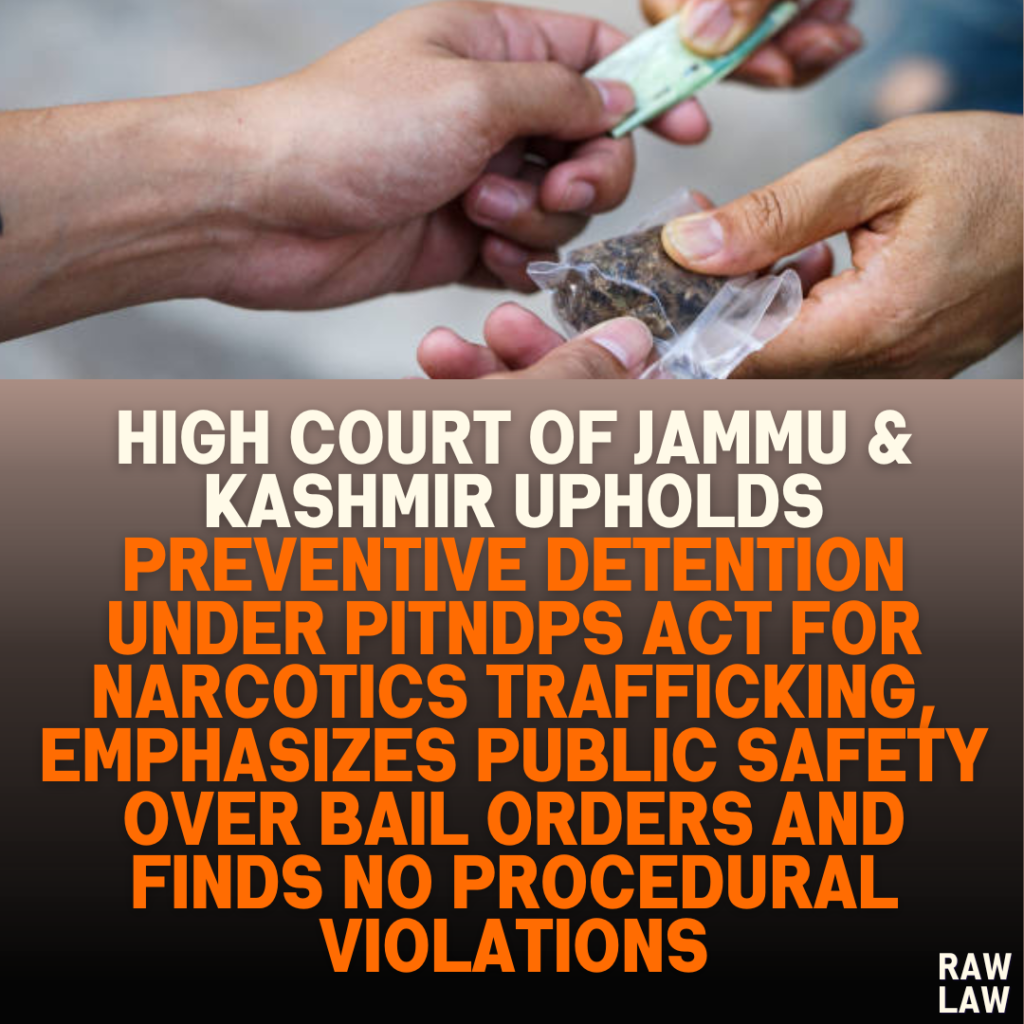Court’s Decision:
The High Court of Jammu & Kashmir and Ladakh dismissed the petition challenging the detention order of the petitioner under the Prevention of Illicit Traffic in Narcotic Drugs and Psychotropic Substances (PITNDPS) Act, 1998. The court upheld the detention order, concluding that there was no violation of constitutional or statutory rights. The court highlighted the preventive nature of the detention, emphasizing the necessity to protect public welfare.
Facts:
The petitioner was detained under Section 3(1) of the PITNDPS Act, 1998, by an order passed by the Divisional Commissioner, Jammu, on 19.03.2024. The detention was based on the petitioner’s involvement in narcotic trafficking, with two specific FIRs filed against him in 2022 and 2024 under the NDPS and Arms Acts. Despite being granted bail in both cases, the authorities decided on preventive detention to prevent further criminal activities.
Issues:
The primary legal issue was whether the preventive detention order was valid, given that the petitioner had been granted bail in the criminal cases, and whether the authorities followed the necessary procedural safeguards under the Constitution and the PITNDPS Act.
Petitioner’s Arguments:
The petitioner argued that:
- The detention order was based on two FIRs for which bail had already been granted, with no compelling reasons provided for preventive detention.
- The detention relied solely on the police dossier, lacking independent application of mind by the Detaining Authority.
- The material supporting the detention was not communicated within the required timeframe, violating Section 3 of the PITNDPS Act.
- The grounds of detention were technical and not adequately communicated in a language understood by the petitioner, infringing on his constitutional rights under Article 22(5).
Respondent’s Arguments:
The respondents contended that the detention was necessary to prevent further illicit activities, as the petitioner was continuously involved in narcotic drug trafficking, posing a serious threat to public welfare. They argued that all procedural safeguards had been followed and that the petitioner’s claims were without merit.
Analysis of the Law:
The court emphasized the distinction between punitive and preventive actions, referencing past Supreme Court rulings that clarified preventive detention aims to stop future criminal conduct rather than punish past actions. The detention under PITNDPS is precautionary, based on the Detaining Authority’s satisfaction that the detainee may engage in harmful activities if left free.
Precedent Analysis:
The court cited key judgments, including:
- Haradhan Saha v. State of West Bengal, where preventive detention was held distinct from criminal prosecution, emphasizing its focus on preventing future crimes rather than punishing past conduct.
- Khudiram Das v. State of West Bengal, which highlighted the preventive nature of detention, based on reasonable suspicion rather than definitive proof.
- Secretary to Government, Public (Law and Order) v. Nabila, underscoring that a single act could justify preventive detention if the threat to public safety is imminent.
Court’s Reasoning:
The court reasoned that the petitioner’s involvement in narcotics trafficking posed a significant risk to public health and safety. The court found no procedural violations, as all materials were provided to the petitioner in languages he understood. The subjective satisfaction of the Detaining Authority was not subject to judicial review unless procedural safeguards were violated, which was not the case here.
Conclusion:
The court concluded that the detention order was legally valid, and no constitutional or statutory rights of the petitioner were violated. The petition was dismissed, and the detention was upheld.
Implications:
The decision reinforces the principle that preventive detention under the PITNDPS Act is a tool to safeguard public welfare, especially in cases involving illicit drug trafficking. The court’s ruling clarifies that preventive detention can be upheld even when bail has been granted in related criminal cases, as long as the procedural requirements are met.




Pingback: Supreme Court Quashes FIR Alleging Rape Based on False Promise of Marriage: No Prima Facie Case of Consent Under Misconception of Fact, Cites Consensual Relationship - Raw Law